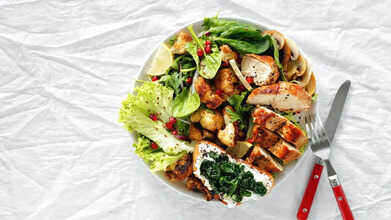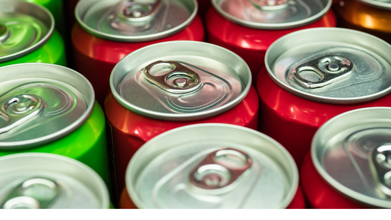- Health Conditions A-Z
- Health & Wellness
- Nutrition
- Fitness
- Health News
- Ayurveda
- Videos
- Medicine A-Z
- Parenting
Unable To Fight Sugar Cravings? Try These 19 Food Items

Sweet craving (Credit: Canva)
Sugar cravings are when you experience a strong urge to eat something sweet and find it difficult to control yourself. Do you often find yourself in the middle of it? If yes, then there are certain foods and beverages, such as fruit, yoghurt, sweet potatoes, and smoothies, that may reduce your cravings. Foods that contain whole grains, fibre, and protein may also keep you feeling fuller longer.
Fruit
When craving sugar, swapping junk food for fruit can provide a sweet hit while offering numerous health benefits. Fruits are naturally sweet and rich in fiber and plant compounds, which are linked to a lower risk of chronic diseases like type 2 diabetes, cardiovascular issues, and certain cancers. They also support sustainable weight management and mental well-being. For a more satisfying snack, opt for fruits with higher sugar content, like mangoes or grapes, or add fruit to yogurt.
Berries
Berries are a great choice for curbing sugar cravings due to their sweetness and high fiber content. This combination helps keep you full longer, making them an excellent option for habit-driven cravings. Berries also offer powerful antioxidants and anti-inflammatory properties, which help reduce the risk of chronic diseases such as heart disease and diabetes.
Dark Chocolate
If you're craving chocolate, dark chocolate is a healthier alternative. It contains polyphenols, plant compounds that provide antioxidant and anti-inflammatory benefits for heart and cognitive health. Compared to milk chocolate, dark chocolate has less sugar and offers more polyphenols. However, it’s best to consume it in moderation.
Snack Bars
Not all snack bars are healthy, but there are low-sugar options available. Choose bars made with whole foods like oats, fresh or dried fruit, and avoid those with added sugars like honey or agave syrup. Alternatively, you can make your own healthy snack bars at home.
Chia Seeds
Chia seeds are rich in omega-3 fatty acids, fiber, and plant compounds. The soluble fiber in chia absorbs water and forms a gel-like substance that promotes fullness, potentially preventing sugar cravings. You can also use chia seeds to make a nutritious dessert like chia pudding.
Sugar-Free Chewing Gum or Mints
Sugar-free gum or mints, sweetened with artificial sweeteners, provide a sweet taste without added calories. Studies suggest that chewing gum may help control hunger and sugar cravings. Plus, it’s beneficial for oral health, potentially reducing the risk of cavities.
Lentils
Lentils are an excellent source of fiber and protein, with one cup providing 18g of protein and 15.5g of fiber. These nutrients increase feelings of fullness, which can help reduce hunger-driven sugar cravings. Lentils also aid in weight management and support healthy blood sugar levels.
Yogurt
Yogurt is a protein-rich, calcium-packed snack that may help reduce sugar cravings and regulate blood sugar levels. Opt for yogurt that contains live cultures and no added sugar to maximize its benefits.
Dates
Despite being high in sugar, dates are packed with nutrients and may help curb sugar cravings. Studies show that consuming dates daily can improve cholesterol levels and quality of life without raising blood sugar significantly. Pair dates with nuts like almonds for a sweet and crunchy treat.
Sweet Potatoes
Sweet potatoes are naturally sweet and filling, making them a satisfying choice when craving sugar. They’re rich in fiber and various vitamins and minerals. Including sweet potatoes in your meals can balance your diet and prevent sugar cravings.
Meat, Poultry, and Fish
Including protein-rich foods like meat, poultry, or fish in your meals can help prevent sugar cravings. Protein suppresses hunger and regulates food intake, which may be especially helpful for weight management.
Smoothies
Smoothies made with fruit and yogurt can be a nutritious way to satisfy a sweet craving. Combining fruit’s natural sweetness with the filling properties of yogurt provides essential nutrients while curbing sugar cravings. Be sure to use whole fruits to retain fiber.
Sugar-Free Soda
Switching to sugar-free soda can help satisfy cravings for sugary beverages without the added sugar and calories. This can be a good alternative if you’re trying to reduce your intake of sugary drinks while still indulging in something sweet.
Prunes
Prunes, or dried plums, are high in fiber and naturally sweet, making them a great alternative to candy. They also help relieve constipation due to their fiber content and the sorbitol, a sugar alcohol, they contain.
Eggs
Eggs are a high-protein food that can keep you feeling fuller for longer. A protein-rich breakfast like eggs may suppress hunger hormones and reduce the urge to snack throughout the day, helping manage sugar cravings.
Trail Mix
Trail mix, often made with dried fruits and nuts, can be a satisfying sweet snack. The dried fruit helps curb cravings, and nuts provide healthy fats and protein. However, trail mix can be calorie-dense, so stick to a small serving size.
Fermented Foods
Fermented foods like kimchi, kombucha, and sauerkraut are beneficial for gut health. The probiotics in these foods can influence hunger and cravings, potentially helping to prevent sugar cravings by promoting a balanced gut microbiome.
Whole Grains
Whole grains are high in fibre and rich in essential nutrients, including B vitamins and minerals like magnesium and selenium. Consuming whole grains can help increase fullness and reduce the frequency of sugar cravings while also supporting gut health.
Vegetables
Vegetables are high in fibre, low in calories, and rich in essential nutrients. Regular consumption of vegetables can improve overall health and help you feel more satisfied throughout the day, potentially reducing sugar cravings.
Trying To Lose Weight? NHS Issues Portion Size Rule For Better Results

Credits: Canva
People who are trying to lose weight may be able to see progress sooner by following a simple tip backed by the NHS. The health service shares guidance for anyone aiming to improve their diet and lose weight in a safe, steady way, including those advised by their GP to slim down. On the Better Health website, the NHS has a page titled Healthy eating when trying to lose weight, which offers practical advice for everyday meals.
One of the easiest rules to put into practice is increasing the amount of fruit and vegetables in your diet. Doing so can also help people meet their five-a-day target, a guideline recommended by both the NHS and the World Health Organisation.
NHS Advice Could Help People Lose Weight Faster
The NHS says fruit and vegetables should be a core part of daily eating. It explains: “When it comes to fruit and veg, eating five portions a day is the minimum you should aim for – but the more you eat the better! They are a good source of fibre, low in calories and great to snack on. Increase your intake and make it a goal to hit your five a day, every day.”
To make this easier, people are encouraged to follow what is known as the “two or more” rule. This means adding at least two portions of vegetables to every main meal. According to the NHS, aiming for two or more portions of veg at mealtimes should make up roughly half of your plate.
Health Benefits Beyond Weight Loss
The World Health Organisation states that eating at least 400g of fruit and vegetables each day is linked to a lower risk of heart disease, stroke, and certain cancers. This means boosting vegetable intake can improve overall health, not just support weight loss.
Alongside fruit and vegetables, the NHS advises people trying to lose weight to include protein in every meal. Protein helps you feel full for longer and can reduce the urge to snack. Good options include eggs, fish, beans, pulses, and lean cuts of meat.
Carbohydrates, Fats, And Dairy Choices
While carbohydrates do not need to be avoided entirely, the NHS recommends limiting them to no more than a third of your daily food intake. When eating carbs, wholegrain versions are encouraged where possible. Dairy products should also be chosen carefully, with low-fat and low-sugar options preferred.
For those who eat fish, the NHS advises having two portions per week, with at least one being oily fish such as salmon or trout. When cooking, oils like olive, sunflower, or rapeseed oil are recommended because they contain healthier unsaturated fats, as per The Mirror.
Staying Hydrated
The NHS also highlights the importance of drinking enough fluids each day. It advises: “Drink six to eight cups of fluid a day. Water, lower-fat milk, tea, coffee, sugar-free drinks. They all count!”
Portion Size Still Matters
Alongside food choices, the NHS stresses that portion size plays a major role in weight management. It notes: “The amount you eat is just as important as what you eat – no matter how healthy your diet is, you can still put on weight if you are eating too much. Having more calories than your body needs each day can lead to weight gain.”
In general, the recommended daily calorie intake is around 2,500kcal for men and 2,000kcal for women. For people trying to lose weight, this usually drops to about 1,900kcal for men and 1,400kcal for women.
WHO Asks Nations To Increase Taxes On Sugary Drinks To Reduce Diseases

Credit: Canva
The World Health Organization is asking countries across the world to increase taxes on sugary drinks and alcohol to reduce cases of chronic conditions such as Type 2 diabetes, obesity, heart disease and fatty liver.
In a January 13 virtual conference, WHO Director-General Dr Tedros Adhanom Ghebreyesus said: "Health taxes have been shown to reduce consumption of these harmful products, helping to prevent disease and reduce the burden on health systems.
"At the same time, they generate an income stream that governments can use to invest in health, education and social protection."
According to a recent report on sugar-sweetened beverages taxes, at least 116 countries tax sugary drinks, including sodas or carbonated canned drinks, but other high-sugar products, such as 100 per cent fruit juices, sweetened milk drinks and ready-to-drink coffees and teas, escape taxation.
Additionally, another report on alcohol taxes shows that even though 167 countries levy taxes on liquor, wine and beer, alcohol has become more affordable or remained unchanged in price in most countries since 2022, as taxes do not get adjusted for inflation and income growth.
How Will A Tax Increase on Drinks Help?
Regularly consuming beverages filled with added sugar or preservatives can pave the way for the development of weight gain, inflammation, insulin resistance, and metabolic dysfunction, despite regularly working out and eating a balanced diet.Apart from increasing the risk for diabetes and heart disease, sugary drinks can also worsen the risk for dental problems, gout, non-alcoholic fatty liver disease and potential kidney/bone issues.
Due to being cheap for consumption, the harmful products are generating billions of dollars in profit for countries and corporations, alike.
However, health systems across the globe are facing mounting financial pressure from preventable noncommunicable diseases and injuries and an increase an taxes will help curb these costs , the WHO said.
Moreover, high tax rates will discourage consumers from buying such drinks and causing long-term damage to their body.
Has This Approach Ever Been Successful?
Yes, the WHO noted that when the UK implemented a tax on sugary drinks in 2018, the country saw a overall reduced sugar consumption, £338 million revenue increase in 2024 and a lower obesity rates in girls aged 10 and 11, especially in deprived communities.
Are Sugary Drinks Only To Blame?
Common preservatives added to foods to prevent spoilage and increase shelf life may also be linked to a higher risk of several cancers and Type 2 diabetes, according to two new studies from France.“These are very important findings for preservatives that are not only widely used in the French and European markets, but also in the United States,” said senior author Mathilde Touvier, principal investigator of the NutriNet-Santé study used for the research, as per CTV News.
The cancer-focused study, published in The BMJ, examined the effects of 58 preservatives among nearly 105,000 people who were cancer-free in 2009 and followed for up to 14 years.
Sodium nitrite, commonly used in processed meats such as bacon, ham, and deli meats, was linked to a 32 percent higher risk of prostate cancer. Potassium nitrate was associated with a 22 percent increased risk of breast cancer and a 13 percent rise in overall cancer risk, results showed.
'Not Sure How He's Alive' Says RFK Jr About Trump's Eating Habits And Drinking Diet Coke

Credits: Wikimedia Commons, X, Facebook
US President Donald Trump’s eating habits have drawn a blunt and unusually candid assessment from Health Secretary Robert F Kennedy Jr, who described them as “unhinged” and dominated by fast food, candy, and Diet Coke.
Speaking on a podcast, Kennedy said Trump regularly consumes what he called “really bad food,” with McDonald’s, sweets, and Diet Coke forming a constant part of his routine. “The interesting thing about the president is that he eats really bad food, which is McDonald's. And then candy and Diet Coke,” Kennedy said, adding that Trump drinks Diet Coke “at all times.”
“Pumping Himself Full of Poison”
Kennedy, who has travelled with Trump, painted a vivid picture of the president’s food habits on the road. “If you travel with him, you get this idea that he's just pumping himself full of poison all day long,” he said.
Despite the criticism, Kennedy also expressed disbelief at Trump’s physical resilience. “He’s got the constitution of a deity,” he remarked. “I don’t know how he’s alive, but he is.”
Why Trump Trusts Fast Food on the Road
According to Kennedy, Trump has his own reasoning for relying on food from large corporate chains while travelling. The president, he said, believes such food is safer and more predictable.
“[Trump] says that the only time that he eats junk food is when he's on the road, and he wants to eat food from big corporations because he trusts it,” Kennedy explained. Trump reportedly worries about falling ill while travelling and prefers food he considers consistent and hygienic.
Kennedy added that Trump’s energy levels remain astonishing despite his diet. “You don’t know how he’s walking around, much less being the most energetic person any of us have ever met,” he said.
A Shift in Tone on Trump’s Health
While Kennedy’s comments about Trump’s diet were sharp, he later struck a more positive tone about the president’s overall health. He said that, in his view, Trump is in excellent physical condition and does not always eat poorly.
“I think he actually does eat pretty good food usually. He's got incredible health,” Kennedy said.
Medical Tests and ‘Exceptional Health’ Claims
Kennedy also cited a medical assessment conducted by Dr Mehmet Oz, referencing Trump’s test results. According to Kennedy, Dr Oz reviewed Trump’s medical records and found unusually high testosterone levels for someone over 70. “He’s got the highest testosterone level that he’s ever seen for an individual over 70 years old,” Kennedy said, adding that Trump would likely be pleased to hear that repeated publicly.
Last month, the White House released details of an MRI scan that described Trump as being in “excellent health.” In a memo, Trump’s physician, Navy Captain Sean Barbabella, said the president’s cardiovascular system was in excellent condition, abdominal imaging was normal, and “all major organs appear very healthy and well-perfused.”
Addressing Age and Visible Bruising
The medical disclosure came amid ongoing public scrutiny of Trump’s health, particularly as he is set to turn 80 in June and is the oldest person ever sworn in as US president.
The White House also addressed visible bruising on Trump’s right hand, explaining that it was linked to aspirin use as part of a standard heart-health regimen.
Inside Trump’s Latest Medical Report
Following a recent checkup at Walter Reed National Military Medical Center, Trump’s physician described him as being in “exceptional health.” The evaluation, which lasted roughly three hours, included lab tests, advanced imaging, and preventive health assessments as part of his ongoing health maintenance plan.
During the visit, Trump also received his annual flu shot and a Covid-19 booster vaccine.
“President Donald J. Trump remains in exceptional health, exhibiting strong cardiovascular, pulmonary, neurological and physical performance,” Barbabella wrote in a one-page memo released by the White House.
The doctor also assessed Trump’s cardiac age, noting that it appeared to be about 14 years younger than his actual age. Trump is currently 79.
Despite questions around his fast-food-heavy diet, official medical reports continue to present a picture of a president who, by clinical measures at least, remains remarkably fit for his age.
© 2024 Bennett, Coleman & Company Limited

